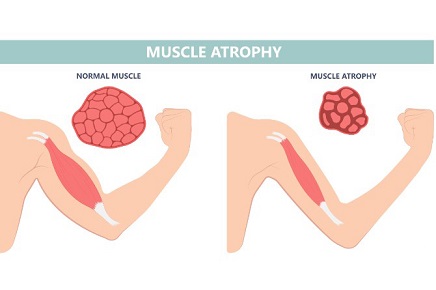Nikhil Prasad Fact checked by:Thailand Medical News Team Jun 30, 2024 1 year, 7 months, 3 weeks, 2 days, 15 hours, 8 minutes ago
COVID-19-News: The COVID-19 pandemic has left a lasting mark on global health. Beyond the immediate threat of the virus, long-term symptoms, often referred to as "long COVID," continue to affect many people. One of the most common and troubling symptoms is muscle fatigue. Recent research by scientists from Boston University Chobanian-USA, Hospital for Special Surgery-USA, Icahn School of Medicine at Mount Sinai-USA, University of Texas at Arlington-USA and New York University, New York-USA that is covered in this
COVID-19 News report, has delved into understanding how COVID-19 impacts muscle health and energy metabolism, shedding light on why so many people experience lingering fatigue even after recovering from the initial infection.
 COVID-19 Causes Muscle Atrophy!
The Study: Exploring Muscle Health in COVID-19
COVID-19 Causes Muscle Atrophy!
The Study: Exploring Muscle Health in COVID-19
The researchers conducted a detailed study to explore the effects of COVID-19 on skeletal muscles. They used a hamster model, which closely mimics human responses to the virus, to investigate changes in muscle tissue over time. The study compared the effects of COVID-19 with those of the influenza A virus (IAV) and a control group that received a harmless solution.
Key Findings: Muscle Atrophy Without Direct Viral Invasion
The researchers discovered that while the SARS-CoV-2 virus (responsible for COVID-19) did not directly invade muscle tissues, it still caused significant muscle damage. Unlike the influenza virus, COVID-19 led to notable muscle atrophy, meaning the muscle fibers shrank in size. This atrophy was observed even 60 days after the initial infection, suggesting a long-lasting impact on muscle health.
Understanding Muscle Atrophy in COVID-19
To understand why muscles were shrinking, the researchers looked at various cellular and molecular changes. They found that the genes responsible for muscle growth and energy production were significantly downregulated, or less active, in the hamsters infected with SARS-CoV-2. This downregulation affected key components of the muscle cells, including those involved in protein synthesis and energy metabolism.
The Role of Interferons and TNF-α
One of the critical findings was the role of interferons and tumor necrosis factor-alpha (TNF-α), which are part of the body's immune response. During the acute phase of COVID-19, the combined effects of these molecules appeared to disrupt normal muscle function. When muscle cells were exposed to these immune molecules in the lab, their mitochondrial function - crucial for energy production - was significantly impaired. This disruption likely contributes to the persistent muscle fatigue experienced by many long COVID patients.
Comparing COVID-19 and Influenza
Interestingly, while both COVID-19 and influenza trigger an immune response, the effects on muscles were quite different. The influenza virus caused temporary muscle inflammation and immune activation, but these effects subsided relatively quickly. In contra
st, COVID-19 led to prolonged muscle damage and metabolic suppression, highlighting a unique and troubling aspect of the virus.
Implications for Long COVID
These findings have important implications for understanding and managing long COVID. The persistent muscle atrophy and energy metabolism issues suggest that the fatigue experienced by long COVID patients is rooted in significant and lasting changes in muscle health. This insight underscores the need for targeted therapies to support muscle recovery and improve quality of life for those affected by long COVID.
Conclusion: A Call for Further Research
The study highlights the complex and enduring impact of COVID-19 on muscle health. While it provides crucial insights, it also raises new questions about the long-term effects of the virus. Further research is essential to develop effective treatments and support recovery for millions of people experiencing long COVID symptoms. Understanding the underlying mechanisms of muscle atrophy and fatigue will be key to addressing this ongoing public health challenge.
The study findings were published in the peer reviewed journal: Biomedicines.
https://www.mdpi.com/2227-9059/12/7/1443
For the latest
COVID-19 News, keep on logging to Thailand Medical News.
Read Also:
https://www.thailandmedical.news/news/antibodies-elicited-by-inactivated-viral-vaccines-against-sars-cov-2-nsp3-found-to-also-target-host-muscle-and-neuroglial-cells
https://www.thailandmedical.news/news/drug-news-metformin-the-wonder-drug-now-shown-to-be-able-to-prevent-muscle-atrophy-and-muscular-fibrosis-in-a-randomized-clinical-trial
